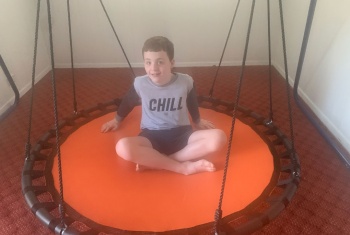NDIS participant, Drew, 13, has adapted well, transitioning straight from regular speech therapy to doing it virtually using online platform Zoom.
Drew’s speech therapist, Angi, from 180° Disability & Mental Health Services, said she was really happy with the way Drew concentrated on his work and his ability to engage with her online.
“Drew did so well,” she said. “The only thing different is I wasn’t physically in the room!
“I could see he was much more relaxed in his own home environment, he was enthusiastic, engaged and as a result he did really well.
“When we finished, Drew showed me around his room. He showed me all his belongings. I even got to meet his cat! This is something you can’t do in a regular therapy session!” she said.
Feedback from Drew was positive too.
“I really enjoyed my session with Angi. I was able to do my work at home, without having to worry about contracting the Coronavirus, considering I have asthma,” he said.
Behind Angi and Drew’s positive outcomes, and many more like it, is 180° Disability & Mental Health Services Director, Trent Baker, General Manager, Aaron Carpenter, and Allied Health Manager, Lisa Burnicle.
All have lived experience with disability, and together they almost instantaneously transitioned their business to online platforms, like Tele-Health and Zoom, to continue to provide face-to-face support to all their participants during the COVID-19 pandemic.
Trent said under the current climate, it was an easy fix to meet virtually with participants to continue to support them through these uncertain times.
“We provide a range of therapies – psychology, occupational and speech therapy, behavioural support, direct support, clinical nursing intervention and personal and group training sessions to people aged 8 to 65, right across NSW, Queensland and Victoria, and so far our participants have been responding well to the new online environment,” he said.
“We know people are being cautious with COVID-19. Many are reluctant to meet with therapists and support workers in their homes but for us, being able to easily switch our services to online platforms has been so beneficial, and it’s great we can continue to provide support to people.”
Aaron said the online sessions have opened up a “whole new environment for participants many were not even aware of and now people of all ages are embracing these virtual platforms.
“Today, young people are so technology driven so we’ve found our younger participants have adapted easily to the new online platforms and it’s increased parent participation as well.
“For people not so tech savvy, once we teach them how to get going, they say they are really enjoying it,” Aaron said.
Trent added, “It’s the fact they can still see us – we are there virtually, and when therapy is being conducted we are interacting with them face-to-face. We can show them things and they can show us things they normally wouldn’t be able to in regular therapy sessions.
“We are also gathering participant feedback to see which platforms people prefer. If you don’t have a laptop, Zoom isn’t going to work for you so we look for other possible platforms, like Whatsapp or Facetime – ones you can easily use on your phone, or if they prefer we can just give them a call.”
Lisa said all online therapies are still very client centred and each session depends on what the therapist has been working on with each participant.
“With our mental health participants, we’ve found many are really struggling with changes to their routine so in these therapy sessions we are focusing on implementing new routines,” she said.
“What was normal before isn’t normal now so we talk through strategies about how they can get life’s basic necessities done and how they will do it, so we’re doing a lot of solution-based therapy.
“Routine is just so important for everybody,” Lisa said. “We don’t realise how important it is until it changes."
The trio encourage people to make contact with their service providers to see what online platforms are available, and they stress it is vitally important for therapies to continue.



